Samuel F. Macagba III graduated from UA&P in 2009 (AB Humanities with Professional Certificate in Development Education). He is currently the grade school principal of Xavier University-Ateneo de Cagayan. He manages two campuses with a student population of 2,193 and 136 faculty members and staff.
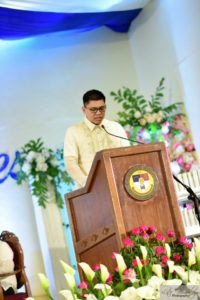
What made you decide to pursue education in college?
Having nurturing teachers in my growing up years who helped me and supported me inspired me to do the same to other students who have similar or even challenging household experiences. The school had been my haven and sanctuary. I could not see another profession that would allow me to do the same to others.
However, when I studied in UA&P, I must admit that I got confused with what to take when we were already asked to apply for our desired courses. There were a lot of competitive and perhaps more rewarding career choices that come along with other programs of study. But I was reminded by my “why,” and it was very clear to me that I wish to make a difference in the school, one child at a time. No amount of fame nor monetary or even practical rewards can ever compensate for the opportunity to make a difference in a child’s life.
What was most memorable in your UA&P/SED experience?
One of the memories that is still vivid to me is my participation in the vibrant student activities. I remember running for the position of president of the Student Executive Board. I ran against two talented student leaders, who were my friends and club mates in our theater organization, Dulaang ROC. Unfortunately, we were not able to rally enough students to meet the target votes. A failure of election was declared. During the special election, I withdrew from the race and decided to run for president of Dulaang ROC.
Those experiences were very humbling because they molded my leadership perspective, especially in the aspects of humility, patience, and service. As an aspiring educator that time, I realized the importance of empowering people to understand their role in improving student life and even in student leadership. I realized that while I see myself as a leader, the real and the most important challenge is to create an engaged and participative leader in each student. Because of that experience, I developed a more burning desire for the importance of education that empowers young people to become leaders.
In the School of Education and Human Development (SED), my apprenticeship has been the most memorable. I remembered being assigned to San Joaquin Kalawaan High School. It was tough. My theoretical knowledge and idealism were challenged by the real and practical conditions in the classroom. I realized that there is so much to do, prepare, and learn to become a good teacher, but it must always stem from understanding the context of the student. There is no quality education without understanding the context of the student. The strongest inspiration for a teacher would be to bring out the potentials of the students.
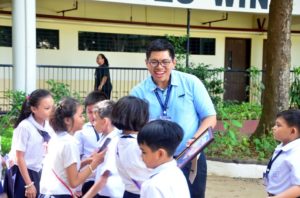
How did your UA&P education make an impact on your personal and professional development?
For one, I am grateful for the scholarship given to me. I would not be able to have a quality UA&P education if I were not granted a scholarship. Because of that, I want my education to matter. I make sure that in everything that I do, I empower individuals to do the same. This is my way of paying it forward.
Because of my UA&P education, I fell in love with the idea of always considering the social dimension of my work. I think UA&P’s curriculum has such a strong emphasis on the value of citizenship that it became so embedded in my teaching philosophy – to empower individuals to develop an overflowing love for country that can bring change to their community through education.
What was your first job after graduation?
I worked as a Youth Leadership Development Unit Associate of Ayala Foundation, Inc. I helped in preparing the Ayala Young Leaders Congress, where I participated when I was a college student. While doing this, I also helped the unit do various capacity development activities for young leaders and various election-related campaigns.
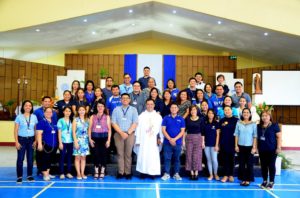
How did you end up in Cagayan de Oro?
At one point in my life, I tried to discern if I were called to be a Jesuit. The Jesuits sent me here in CDO to discern and to work in Xavier University Junior High School. I stayed because I love how laidback the city is. Working here as a teacher made me realize that my first love is teaching. It is one of the biggest factors why I stayed in this city. Then I met and married my wife, who is a resident of CDO, last April 29, 2017. The rest is history.
What is the scope of your responsibilities in your current post?
Basically, I am tasked to manage the whole grade school unit. I oversee two campuses. I monitor the performance of the teachers and the pupils, and I engage various stakeholders in my school community.
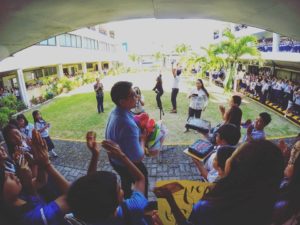
What are the rewards and challenges in your job?
One of the challenges in this job is time constraints. Since I am the principal of two grade school campuses, I attend to the multiple needs of the faculty, staff, pupils, and parents. As such, I rarely have control of my time, and I need to make a deliberate effort to use my time wisely, balancing my professional, academic, and personal time to deal with the demands of my work.
Another challenge is my age. I am the youngest principal in all Ateneo Schools, and the youngest unit head in Xavier Ateneo. Because of this, sometimes I feel that I need to assert more, to learn more, and prepare more to compensate for my age. I sometimes encounter stakeholders in my community who get surprised when they discover that I am the head of the unit. Honestly, I wish I had more experience in leadership so that I can lead my community better. There are concerns that I feel are beyond my years.
On the other hand, as education is clearly my advocacy and vocation, it is an honor to effect significant change and impactful contribution to the lives of many. As a principal, I would be able to positively forward my advocacy and principles to the members of the school community.
In addition, it is rewarding for me to witness the quality of giving of each member of my school community. I feel affirmed when I see the teachers’ generosity toward their pupils. I am proud of the students’ achievements and learning. I am blessed because the students’ parents have the initiative to contribute to the school. During these times, I can see how God works immensely in my life and in my own giving as well.
Being a principal helps me actualize my deep convictions, especially in my mission of empowering young people to contribute to society. There are many areas and opportunities by which one can contribute to the community. Mine happens every day whenever I enter the school, greet my students, guide my teachers, and interact with the stakeholders. I firmly believe that I can contribute to our country and the world—one classroom and one child at a time.
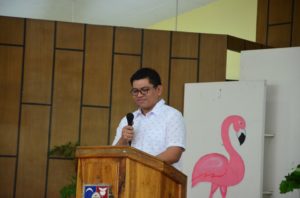
How do you see the future of your career?
Educational leadership can be so challenging yet rewarding at the same time. Since I am appointed for a given period, I am not certain of the future of my career although I am open to the many possibilities. I welcome the idea of going back to the classroom. I find joy in teaching students. I also feel very positive in empowering the teachers. Currently, I wish I could finish my dissertation soon and gain my doctoral degree. I am passionate with research, especially those that would have a direct impact in improving the teaching and learning process. I also see myself taking trainings to be a certified yoga teacher and contribute significantly to the well-being of my stakeholders.
What is your advice to aspiring educators?
I would like to borrow the words my University President, Fr. Roberto C. Yap, SJ, shared to our community: “Go boldly to the frontiers!” I have met many young people who wanted to be teachers but were scared or worried to take this career path for various reasons. But, now more than ever, teachers are needed to improve our community. Great professionals start from the empowering vision of a teacher. You are needed. Be bold, be a teacher, and make a daily commitment to go forth and respond to the greatest needs of our country through the empowering instrument of education.#
Leave a Reply